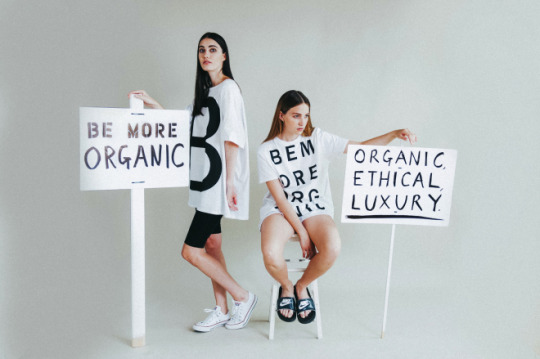#and is giving up on a lot of their favourite things cause of capitalistic bullshit and high prices
Explore tagged Tumblr posts
Text
I. Am filled with anti-capitalist rage.
#partner just wants to be able to rent their own house so they can have their own space#but hav basically given up because prices are getting too high#and is giving up on a lot of their favourite things cause of capitalistic bullshit and high prices#I’m. going feral.#I’m gonna kill everyone and live in a commune where my partner can be happy and do whatever the fuck he wants#I’m violent and have nothing to do with it#🪲
5 notes
·
View notes
Text
LET’S TALK ABOUT ETHICAL FASHION PLS
Ethical fashion: ‘an approach to the design, sourcing and manufacture of clothing which maximises benefits to people and communities while minimising impact on the environment.’ Ethical Fashion Forum

(Source: https://airrclothingblog.com/2015/03/06/brand-profile-beaumont-organic-available-at-airr-clothing/)
Wow. Where do I begin?
Actually let me begin with this disclaimer: ANY CRITICISM I MAY MAKE ABOUT CERTAIN SITUATIONS/ORGANISATIONS/GROUPS OF PEOPLE IS NOT AN ATTACK ON THESE PEOPLE AS INDIVIDUALS BUT THE SYSTEM FROM WHICH THEY HAVE DERIVED FROM.
K lets begin.
So I guess you could say I’ve been in/observing the ethical fashion scene for about 4/5 years now. During my first year of uni I realised I needed to go beyond complaining about the oppression of garment workers and start acting, and decided to create a blog called Oh So Ethical. My first thought was to create an ethical fashion blog where I styled outfits I’d made out of secondhand clothes, and raved about the latest ethical brands I loved (I cringely called this ‘Fridays Five Ethical Faves’ ffssssssss). After a while I stopped, but went back into it when my cousins and I realised we needed somewhere to share our opinions, ideas,and hopefully inspire others to think and act ethically- and so we rebranded Oh So Ethical and made it what it is today.
At the beginning I tended to place a large emphasis on ethical brands that we liked and bought from. ‘Ethical is the new black’ was my favourite slogan. However, as the years have gone on, and with more interaction with activists, friends, random people I’ve met, and having witnessed the ongoing exploitation of garment workers continue year after year, I have become extremely cynical of the effectiveness of ethical brands, particularly ‘ethical fashion’.
Indeed, through learning from others and seriously thinking about ethical fashion, questioning whether it is an actual means of empowerment for workers,and if it will ACTUALLY dismantle the system of oppression, I have come to a conclusion:
It’s a resounding NO.
Here’s y.

(Source: https://fashionindustrybroadcast.com/2017/06/12/sustainable-ethical-fashion-faux-has-never-looked-so-real-or-this-stylish/)
I recently read an amazing article in The Guardian by Martin Lukacs, which really helped me understand the underlying processes behind ethical fashion. To sum it up, we live in a neoliberal society, where we are taught to act and thrive individually. When it comes to activism, we are taught to focus on how we, as individuals, can change the situation, and are made to feel personally responsible and guilty for the world’s problems. Due to the guilt created by this individualism,we feel the need to relieve our guilt by acting in a way that makes us feel better, and as we are seen as consumers (as opposed to citizens) within neoliberal ideology, our means of creating change is through buying and consumption e.g. buying ethical clothing.
While these individual actions are undoubtedly important, by placing such a great emphasis on individualistic activism, we are intentionally being steered away from focusing on the real perpetrators at large: CORPORATIONS- who are out here exploiting workers and the environment, and continue to get away with it. In turn, we are made to neglect the fact that we need to be targeting the root causes of exploitation, including the deregulation of state power that allows corporations to get away with murder, and the capitalist system that puts profits over people, encouraging exploitation and greed. By steering our attention away from such issues, corporations can continue making profits and getting away with their bullshit, while we discuss the pros and cons of bamboo leggings. (see more: https://www.theguardian.com/environment/true-north/2017/jul/17/neoliberalism-has-conned-us-into-fighting-climate-change-as-individuals)
Author of Stitched Up: The Anti-Capitalist Book of Fashion’ Tansy Hoskins provides a similar discourse, adding that we are encouraged to trust in capitalism to make change and better the world; that companies can be made ethical through our consumer actions. However, the contradiction is that corporations have only become stronger and continue to exploit workers/resources, despite their greenwashing and attempts to come across as ‘green’ and ‘sustainable���. More shopping is not going to free workers from this system. By using consumerism as a sole means of empowering workers, we are utilising the very system that has led to the exploitation of workers in the Global South, namely capitalism, without even acknowledging or striving to challenge or dismantle it. (see more: https://oxfordleftreview.com/olr-issue-14/tansy-hoskins-neoliberalism-and-fashion/)
In an insightful article on White Saviour Complex and Fair Trade, Bani Amor delves into the colonial connotations of attempts to ‘save’ the world via ethical companies, which are argued to share parallels with the colonial activities of the West going into the Global South and attempting to civilise the ‘Other’ with its saviour tactics, thus ensuring domination over the GS and its resources, validating supremacy. I’m not saying ethical companies are going to these countries on colonial conquests, but we really do need to understand the historic relevance of colonialism in interactions between the Global North and South such as these. If you go to these countries, get products made, sell them in the name of ‘liberating workers’ while not giving them a say or listening to them, and continue to stay silent on the structural system that has resulted in your existence as an ethical brand, you are falling into dangerous territory.
The article also reviews research on cause-related marketing, which is basically when corporations and nonprofit charities combine to promote sales and causes simultaneously. By tying serious social causes such as poverty and exploitation to making profits, this results in the depoliticising and downplaying of such causes, and provides an undignified, extremely simplified solution to a complex, very dire situation.
Finally, one pivotal point made is the fact that coloured women, through this process of ‘saviourism’ are made both “hypervisible, but also invisible- ‘seen but not known’”. Their existence is highlighted, but they are simultaneously being silenced, as workers are spoken over, dehumanised and patronised by brands and movements that are supposed to be ‘empowering’ them. (read more: https://www.bitchmedia.org/article/spend-save)
In general, the ethical fashion movement tends to solely focus on how we can individually change the industry and ‘save’ workers in a way that utilises and continues to prop up the very system that is screwing workers over in the first place, conflicting with its ‘empowering’ rhetoric.
GREAT SO WTF DO I DO NOW THEN MAYISHA.

(Source: http://www.vqronline.org/reporting-articles/2014/04/ghosts-rana-plaza)
Okay so I know I’ve painted a very dull image of ethical fashion, and I know not all ethical brands are the same, etc etc. However, when the industry constantly paints ethical fashion as a positive means to an end, neglecting the issues surrounding ethical fashion, alternative viewpoints are needed.
I get a lot of people asking me for advice e.g. about ethical brands, how to be more ethical etc. Ultimately we want our goods to be made by workers who were treated fairly. Personally, I stick to secondhand- it’s cheaper for me and helps reduce waste in landfill. I do like ethical clothing, and knowing where my clothes/jewellery has come from, but if I do buy ethically I will from now on be seeing what that brand is doing to support garment workers and in calling out corporations, so if you’re an ethical brand prepare for a QnA sesh with ur girl.
One thing I would advise is to not simply boycott the high street- this comes from trade unionists and garment worker activists in Bangladesh. They want to produce garments and a source of income, they just don’t want to be tortured in the process (obviously). At the same time, we cannot deny that our excessive consumption is part of the problem, so if you need a new jacket- please just buy your jacket and not a jacket, 5 tops and 6 dresses because they were half price- really think about your purchases. Being a ‘shopoholic’ is a cute insta aesthetic but its seriously impacting the environment and feeding the system of worker exloitation.
Also acknowledge that a lot of people simply cannot afford to buy ethically, and should not be made to feel guilty for going to primark to buy jeans.
One thing I also really want to highlight, as you would have probably guessed from the blog, is that our activism is not limited to our purchasing. We need to be vocal, we need to be out there demanding change from corporations, calling them out, exposing them etc. Something as little as a tweet, an email, and insta post can go a long way guys. I know its not in fashion to support such movements (pardon the pun) but we really have to keep pushing- we cannot afford to wait for another Rana Plaza for us to take action.
This might piss people off. I’m sorry. But understand that a few years ago I was the same as the very organisations and brands I’m talking about, and it took criticism like this to understand that I needed to rethink my activism if I were to truly create change. Plus, you feel pretty helpless after hearing of a factory fire every other week, another worker protest because factory owners didn’t pay their workers that month, stories of sexual abuse of young females from management, refugees being exploited, masses of workers fainting simultaneously, and NO ONE CARING. Not even the very people who by default should be sharing and raising concerns about these issues. It’s surreal.
We have groups and regular discussions on twitter that enable ethical brands to get together, support each other and discuss how we can promote ethical brands and use them etc. It’s nice how such elaborate forms of unity can be created surrounding ethical branding but little is done to address the very problems that has led to the reason these ethical brands exist, and how to put an end to worker exploitation. Again, we are steering towards ‘solutions’ that aren’t actually solutions, but are utilising capitalism and perpetuating the neoliberal stance that we need to individually create the change.
BUN THAT SHIT.
Things are going to start changing.
We are not only going to change the world with our individual practices, we are going to change the garment industry in a way that emphasises our solidarity and support for garment workers, creating a mass solidarity movement. We are going to call out corporates when we clock their messy moves and let them know as consumers we don’t f*ck with them unless they treat their workers with dignity. We are not going to buy our way to change, we are going to collectively DEMAND it.
We have no choice but to.

(Source: http://thechronicleherald.ca/world/1126316-bangladeshi-garment-workers-protest-on-may-day)
#fashion#ethicalfashion#ethical fashion#ethical#ohsoethical#ootd#garment industry#garment workers#garmentworkers#garmentindustry#workers rights#workersrights#rana plaza#ranaplaza#bangladesh#capitalism#neoliberalism
1 note
·
View note